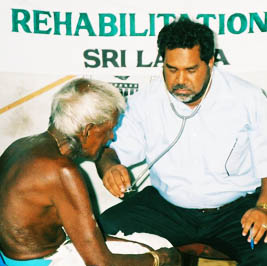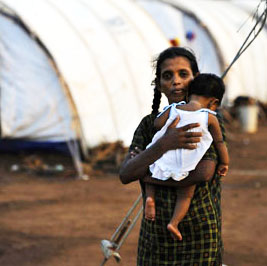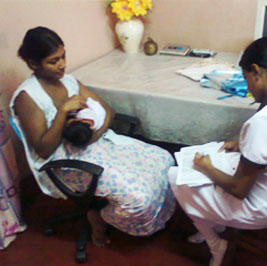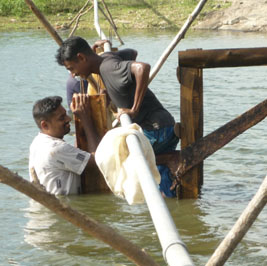


Millions of school-age children will never see the inside of a classroom. Millions more find themselves in overcrowded classrooms with untrained and underpaid teachers and no books or equipment. We make sure children growing up in the toughest circumstances get a decent education - in particular, children facing conflict, poverty and discrimination. We support local organizations set up schools and pre-school centres in refugee camps and rural villages. Children from minority ethnic groups, disabled children and girls are more likely to be out of school, the World Bank recognises that educating girls is the single most effective way to tackle poverty we the CRC are striving to make sure all children get an equal opportunity at a good education.
Children are Special; Childhood is a Special Time, A Time for Wonder, For Learning & Growing. Sadly today this is not the case children are exploited in many ways. Those in the developed world may think this is over however Children continue to be marginalized by armed conflict, natural disasters, sexual exploitation, trafficking, and HIV/AIDS in poorer countries such as Sri Lanka. Given the right tools and the right opportunities these children can lead the human race to scale greater heights.
Children in Sri Lanka do face numerous risks. Many view children as slaves, we as an organization are educating the community and children themselves about their rights and how to protect them. Supporting and protecting the child’s rights is our priority. The CRC’s strategy for child protection aims to increase the realization of the rights of children, particularly those in need of special protection. This organization exists to improve the lives of children around the world affected by conflict, deprivation, poverty or other hidden crises, by working in partnership with local communities to provide education, health and protection.
Biodiversity - the immense variety of Life on Earth - is what makes our planet not only habitable but beautiful. We depend on the natural richness of our planet for the food, energy, wood, raw materials, clean air and clean water that make life possible and which drive our economy. But we also look to our natural environment for less tangible things such as aesthetic pleasure, artistic inspiration and recreation.
We are committed to educating the rural communities on how to make use of their surrounding habitat while protecting it for our future generations.
The destruction of the environment especially takes place in the rural community. Why? They rely solely on the lush forests as their means of survival, using the trees as fire wood, to build houses etc.. through educational programs we show these ones how to use the environment while protecting it and preserving it for future generations. This educational work is being carried out from school level upward. We promote the growth of crops that use water economically to save precious water. The CRC involves the local communities in strengthening and protecting natural forests thereby creating awareness amongst the peoples of the importance of protecting the environment.
.

We provide new technology and training for such ones to develop their skills and abilities ever more to increase productivity. This in turn will bring a great many benefits to them to the community and increase the productivity of the nation. The CRC has identified key areas. They are: fisheries and agricultural areas the main income generators for the North East community.
.We provide information to the jobless youth on vocational training courses available to ensure that they use their time wisely and improve their job prospects so they can start to live independent lives. The CRC provides educational seminars to those who are working, on how to improve their businesses and skills, providing new technologies and methodologies to these ones. We organize educational seminars for school children to help them make full use of their lives for the betterment of themselves and the community.
.

Around 1.1 billion people globally do not have access to improved water supply sources whereas 2.4 billion people do not have access to any type of improved sanitation facility. About 2 million people die every year due to diarrhoeal diseases, most of them are children less than 5 years of age. The most affected are the populations in developing countries such as Sri Lanka, living in extreme conditions of poverty. Among the main problems which are responsible for this situation are: lack of priority given to the sector, lack of financial resources, lack of sustainability of water supply and sanitation services, poor hygiene behaviors, and inadequate sanitation in public places including hospitals, health centres and schools. Providing access to sufficient quantities of safe water, the provision of facilities for a sanitary disposal of excreta, and introducing sound hygiene behaviors are of capital importance to reduce the burden of disease caused by these risk factors.
To avoid many diseases and health problems simple sanitary steps need to be implemented and followed by the community. However due to a lack of proper guidance these simple steps are not adhered to. The CRC is in the process of educating these ones by means of health and sanitation educational programs which instill proper guidance on simple sanitation procedures.
Working with communities rather than for them, our work leads to sustainable change. We help reduce maternal and child mortality through sustainable community based health services focusing on nutrition, immunisation, safer birthing techniques, fully equipped health centres, water and sanitation. Our health education program includes,
The CRC has primarily helped those affected by the two decade long civil war. Rehabilitation of such ones has included:


In many low income villages that exist a plenty throughout the north and east of the country the women are educated by the CRC in:
Human Rights refers to "the basic rights and freedoms to which all humans are entitled.. Human Rights include the right to life and liberty, freedom of thought and expression, and equality before the law. The CRC is committed to uphold this by means of its various training projects. In war the lines are often non-existent so it is in the north and east of Sri Lanka where many in the Tamil Speaking Community have suffered human rights violations. The CRC help these ones educating them of their rights as members of the human race together with good governance in order that these individuals are aware of what they are entitled to. We also educate the government and security forces as these ones are responsible for violations, unaware they are committing such infringements.
.

Due to the conflict within the country for the past 20 years, the community have divided in to their ethnic communities they are the Tamil, Sinhala and Muslim communities. The peace that existed between these communities for many centuries is no more. The situation within the government does not help the minority ethnic groups to thrive either. The CRC promotes peace building workshops for these Sinhala, Tamil, Muslim and other minority communities to bridge the gap that has caused much suffering. This is done by incorporating the cultural events of all communities thus fostering an understanding between each other building a unified community of Sri Lankans. We do all this with the objective of completely healing the wounds that have existed between these communities, to help build a road to lasting peace. As all communities live in harmony with one another a sense of security develops and this again leads to a peaceful community of Sri Lankans what we
call a ‘conflict transformation’ takes place no matter what language they speak or religion they adhere to. The CRC firmly believes that A POLITICAL SOLUTION which is accepted by all communities of the country is the way forward and not violence of any kind.
.During the civil war of the past two decades and during the tsunami many civilians lost their lives due mainly to the fact that they were not educated on how to live in times of crisis and disasters, they were the unaware of the necessary actions to take during these times. The CRC has developed an Emergency Preparedness Training Course to ensure that lives lost due to neglect and carelessness will be reduced when the next crisis arises.
.

About 90% of Sri Lanka is rural, thus, water, health, education and transport facilities and services are extremely minimal. The CRC‘s objective is to provide tube wells, proper school infrastructure and equipment, to improve transportation thereby improving the lives of these ones, In these areas by-roads and roads are not developed thus no vehicle can travel safely. Because of this many untimely deaths take place due to lack of proper transport to rush people to hospital they cannot The CRC strives to provide equal opportunities to the children of these villages so they too can get as much chance to blossom as you and I. Who knows the next Einstein could be there.
.There are many who live below the poverty level i.e no income at all. The main problem in Sri Lanka is unemployment which is inherently linked with this. To alleviate this poverty problem the CRC is helping to educate and fund self employment opportunities also providing agricultural ventures aid to improve their crops. Fisheries and Dairy Farming along with other identified areas are funded and helped to expand. They are given training in new technologies through the programs that we conduct thus we hope to fulfill our objective of lifting this community to better levels so that they are in better health the standard of living, their quality of life is raised. Successful implementation of these programs will contribute to the overall national development of the country.
.

The CRC is striving to fulfill their vision of a just, equitable and peaceful world in which women are equal partners with men in determining the values, direction and governance of their societies for the benefit of us all. Our promise to women in Sri Lanka is to enable them to voice their concerns and claim their rights, to work globally for policies and practices which promote equality between men and women. This is important to us at CRC because the woman has such a special, vital, key, role to play in the lives of children. Therefore by helping women we are providing stable platforms for children to stand on and depend on.
We take great pride in promoting this at all levels of our work.
Gender equality is vital for development. However, the scenario is different especially in the South Asia region. Whether it is domestic violence; sexual assault and harassment, violence at abortion clinics, general crimes in relation to gender, sexuality and race, victimization surrounding violence or abductions it all amounts to violence. The CRC realizes that this issue needs to be addressed at all levels and thus helps women speak out against such violence through seminars and forums The CRC also looks to educate men on how to treat women and how they can get involved in bringing about positive change and end violence against women in Sri Lanka. The CRC is striving to create a network of men and women who will take a proactive role in helping to uphold the dignity and rights of women and children.
.

The CRC provides emergency, rehabilitation and development services that empower beneficiaries and dedicates itself to seeking and addressing the long-term developmental needs of its beneficiaries even while in the emergency phase. We recognize that disasters have the most negative impact on the lives of the poor; yet disasters, and especially the movement of the populations, can also bring about unexpected, positive social change. This context can therefore serve as a window of opportunity for eradicating poverty and social injustice.
The CRC focuses on serving people who typically have not received due attention, and in several large-scale crises we have been the first organization to provide high-impact development emergency programming to communities in need. We believe that as a humanitarian agency one of our main functions is to communicate the evident needs of the helpless and affected people in
Protection of Children’s Rights in sri lanka, NGO's in Sri lanka, non-political, non-religious, non-profit organizations in Sri lanka, Entrepreneur Development & Training in sri lanka, Rehabilitation & Reconstruction in sri lanka, Women’s Rights & Development in sri lanka, Peace building & Conflict Transformation in sri lanka, Gender Equality in sri lanka, Environment in sri lanka, Health & Sanitation in sri lanka, Re-Productive Health in sri lanka, Human Rights in sri lanka. Protection of Children’s Rights in sri lanka, NGO's in Sri lanka, non-political, non-religious, non-profit organizations in Sri lanka, Non Gavernment Organisasion in sri lanka.
the community. With this in mind the CRC consults closely with the local communities, government representatives it serves in order to ensure that its programs do not impose solutions from the outside but rather address their needs and requirements for the long term. This grassroots approach proves effective in fostering an environment of self-help and sustainability
During the on-going civil war, natural and man made disasters and other crises the CRC has provided clean drinking water, temporary shelter, food, medicine, and mobile medical clinics as relief measures.
Today for many of the rural community it is virtually impossible to obtain a bank loan because many are too poor to offer much if anything in the way of collateral. Thus many are unable to survive. To avoid this stumbling block the CRC provides a loan to people without asking for any guarantee. This is done by organizing the borrowing party into what the CRC terms ‘small groups’ which consists of 5 individuals who will be trained by the CRC on how best to utilize the loan and help them think in a positive manner. The training also teaches these ‘small groups’ the value of saving. Where they need to save a ‘compulsory amount’ from the profit they make each month which will benefit them in the future. We also make it a rule that a minimum of 5% of the loan amount should be in the account at all times.
Our aim is to significantly reduce the depth and breadth of poverty in the communities within which we operate and help them to stand on their own two feet and help these ones avoid mistreatment by money lenders and provide them with a system where they can produce, manage and maintain their own finances
.

Our objective is to nip this virus in the bud in Sri Lanka before it explodes into unmanageable proportions while helping those suffering from this disease to meet the challenges as best they can. We do this by providing medical treatment, ongoing care and support to follow up on the patients’ progress. A high risk area has been identifies as the Katunayake Export Processing Zone workers and lorry and three wheel drivers who are lonely being away from their family for months and even years.
Some of our programs to educate these individuals:
All of us yearn to have our very own home. Many in conflict affected areas of Sri Lanka are homeless. The CRC has commenced housing construction project to bring make this dream a reality. We have currently completed the building of 15 houses with funds generously provided by the Thawalama Development Foundation (TDF) a local NGO. You too can help us in what ever way you can to build more houses for these unfortunate victims
.

To promote the Organic Farming & environmentally suitable and economically viable agricultural pest in the region. Also conducting education, awareness & job oriented training programmes based on Home Gardening, Paddy Cultivation, Diary Farming, Low country vegetable production, Mushroom Production, How to use New Agricuture Technologies to increase the productivity of smallholder farmers. ..etc.
.